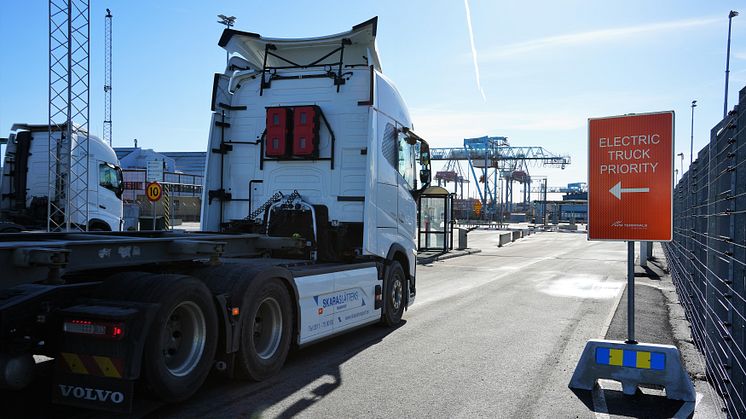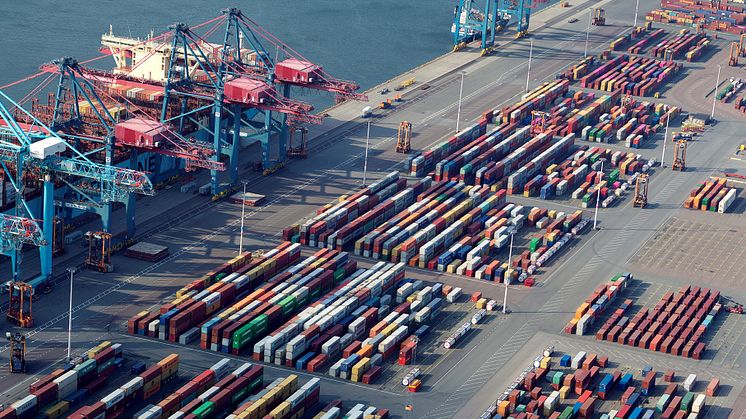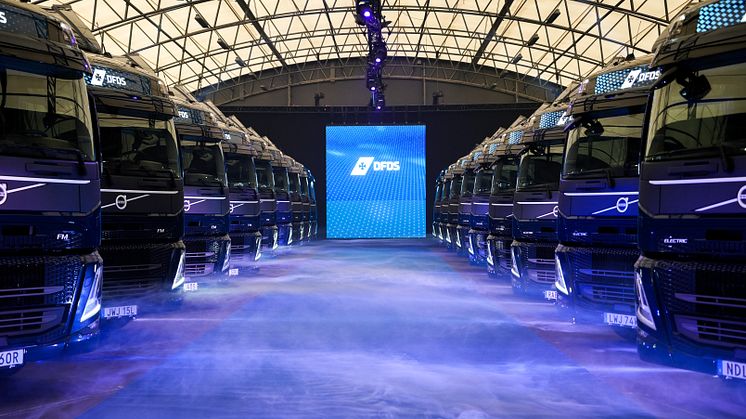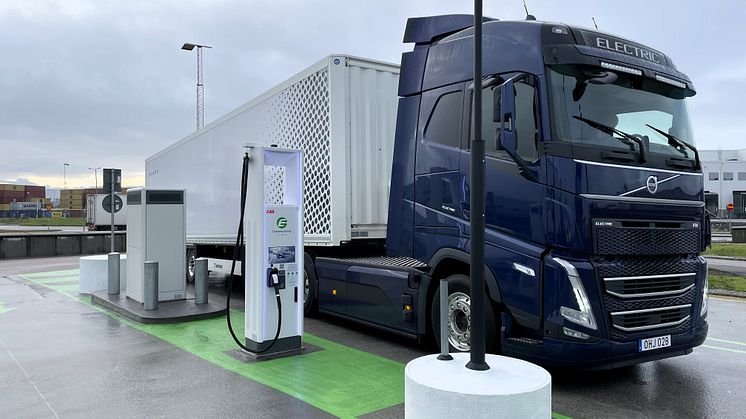
Press release -
APM Terminals introduce priority for electric trucks in the container terminal at the Port of Gothenburg
As of 1 March, electric trucks are being granted priority passage and handling in the container terminal at the Port of Gothenburg. This initiative is being used by terminal operator APM Terminals to favour those haulage firms that have already started to convert their vehicle fleets, while at the same time giving an additional incentive to those considering investing in electrification.
The new solution means that electric trucks will be fast-tracked through APM Terminals’ gate 4 via a reserved lane, and also enjoy prioritised handling within the terminal area. This creates efficiency gains and planning ability that is particularly important for electric trucks, as there are strict demands on optimisation given the limited range of electric vehicles. APM Terminals operates the container terminal in the Port of Gothenburg, the biggest in the Nordic region.
“We’re seeing more and more haulage firms starting to electrify parts of their vehicle fleets, and we know that more are considering investing in a green transition of heavy goods traffic. We hope that supporting these initiatives by offering the fastest possible passage and handling will serve as an incentive and be one small step along the way. Our own container handling operation has been fossil-free for several years, and this solution is fully in line with APM Terminals’ work on sustainability, in which collaboration with our customers is an important key,” says Brian Bitsch, Commercial Manager at APM Terminals Gothenburg.
Breakthrough for electric trucks
Every year, around one million trucks pass through the Port of Gothenburg, with one third of them – or around 1,000 vehicles a day – pass via APM Terminals. So far, however, electric trucks only represent a fraction of vehicles passing through the port’s gates – but a broader-based breakthrough is just around the corner.
On 3 March, the logistics company DFDS will be deploying 20 electric trucks in the flows in and around the port. Sweden’s biggest transporter of containers on the roads, Skaraslättens Transport, recently deployed three electric trucks in flows to and from the container terminal. The new priority for electric trucks has contributed to the haulage firm’s recent decision to invest in two more electric trucks, which will be put into service in May.
“Electric trucks are a major investment, so the fact that we now have priority in the container terminal is really important to us. It means that we can perform more assignments every day, which benefits both us and our customers. It also means that we can recoup the investment more quickly,” says Johan Söderström, Chief Commercial Officer at Skaraslättens Transport.
Paving the way for the transition
Including APM Terminals’ priority measures, there are now three terminals that have a priority system in place for electric trucks. Between them, these terminals handle around 90% of the port’s total truck flows. The other two terminals are operated by Gothenburg Roro Terminal and Stena Line.
“It’s a really important initiative by the terminal operators, which literally paves the way for the transition. With a priority system in place for the terminals that handle the most trucks, and the growing infrastructure for charging in the area around the port, the conditions for electric trucks are better here than at any other port. This is a development we’re incredibly proud of, but there’s still work to be done,” says Martin Adeteg, Vice President Decarbonisation, Health and Safety at the Gothenburg Port Authority.
Topics
Fact file: Port of Gothenburg
The Port of Gothenburg is the largest port in Scandinavia. Around 30% of Swedish domestic and foreign trade passes through the Port of Gothenburg and over 50% of all container traffic. The port is a full-service port, and offers industry guaranteed, climate-smart access to the whole world. Direct services to key markets ensure highly efficient, sustainable, and reliable transport 24 hours a day, 365 days a year. The focus is firmly on sustainability, innovation, and digitalisation in a concerted effort to maintain the ongoing development of climate-efficient freight transport and calls by vessels. With over 30 rail shuttles offering daily departures, companies throughout Sweden and Norway have a direct, climate-neutral service to the Port of Gothenburg. The port handles energy products, vehicles, ro-ro units, containers and passengers. 22,000 people are employed at the port.
Follow us on:
Facebook
Instagram
LinkedIn
Twitter
www.portofgothenburg.com





